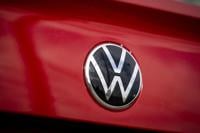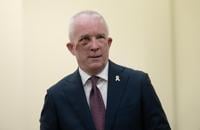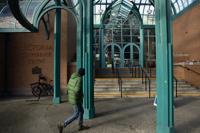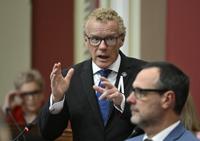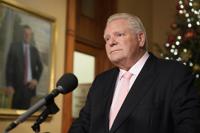Joe Preston cannot stop smiling.
The mayor of St. Thomas, Ont., wakes up with one on his face and it's there when his head hits the pillow at night. But the month-long smile has drawbacks.
"Your teeth wake up really dry," he said, beaming and laughing.
The small city in southwestern Ontario steeped in automotive manufacturing history is set to boom again with the creation of a huge new electric-vehicle battery plant.
Volkswagen, the world's largest automaker, chose the small city for it's third battery-production facility in the world with a $7-billion investment.
"We're winning in spades with this," Preston said.
"We did not know it could grow to be this big and look at what happened here in St. Thomas, Ontario. Dare to dream."
Dozens of Canada's political elite, from the prime minister to Ontario's premier to dozens of other politicians, city workers and the local business community showed up to the flashy event at the Elgin County Railway Museum on Friday morning to discuss the deal.
They stood among historic trains and shiny new Volkswagen cars.
The German company will build a "gigafactory" on a 1,500-acre site that will produce enough batteries for one million electric vehicles each year. Construction is set to begin next year and completed by 2027.
The company says the plant will create up to 3,000 direct jobs and 30,000 indirect jobs.
Ottawa and Ontario teamed up and together offered billions of dollars to lure the German automaker. Ottawa said the deal, which could see upwards of $13 billion of taxpayer money spent, will pay for itself in five years.
Ottawa has committed $700 million in up front capital costs towards the project while Ontario added $500 million.
"With this historic project, we're not just bringing back manufacturing, we're bringing back a strong, thriving economy for this community," Prime Minister Justin Trudeau said with a smile.
Premier Doug Ford, also with a permanent smile on his face, was bullish on the small city's future.
"When I drove through this beautiful town, I thought, 'man, this is gonna be bustling, it's gonna be happening,'" he said.
Dubbed the "railway city", St. Thomas, home to about 42,000 people, has reinvented itself several times over the past few decades.
It rose to prominence as a railway hub, with four major lines travelling through the city more than a century ago. It served as the halfway point between Buffalo and Detroit.
Thousands of jobs came to the area for decades, but the industry declined by the 1960s.
Ford, the auto giant, came to town with a massive assembly plant that opened in 1967.
But the 2008 recession hit the auto industry hard and Ford decided to close shop. In 2011, the final car, a Crown Victoria, rolled off the line.
Some 2,4000 jobs were lost.
Now, the new battery plant will anchor the so-called "megasite" that will become one of the largest industrial parks in North America, said Vic Fedeli, Ontario's Economic Development Minister.
Fedeli said they are looking for five more manufacturing companies to help supply all the parts and critical minerals to support the Volkswagen operation. Each one of those companies, when they are recruited to the province, is expected to invest upwards of $1 billion.
"It's not only a big win for the people of St. Thomas, but it's huge for Ontario," Fedeli said. "It's going to open the door to so many supporting companies that will add further billions in investment and tens of thousands more jobs."
The province is investing $500 million directly with Volkswagen, but will also spend "hundreds of millions" more to build the area to support the influx of thousands of people.
Soon the work will begin on building roads, sewers, water and electricity delivery, Fedeli said. They'll have to build police and fire stations and all the other work that goes into a major city expansion.
There will also be a huge need for housing, one of the province's pet projects.
Negotiations with Volkswagen began a year ago, Fedeli said, and ramped up with a formal pitch from Ottawa and Ontario to the German automaker last October.
The pace of negotiations picked up in the new year, he said.
During that time, the province had identified a site in southwestern Ontario that could handle the size of what Volkswagen wanted to build.
But the site straddled St. Thomas and Central Elgin, Ont., so the province scrambled to redraw the boundaries to enclose the megasite within St. Thomas.
That required legislation that the province passed with incredible speed in just one week in February.
Then, in mid-March Volkswagen's board voted in favour of opening up its first battery plant outside of Europe.
That's when Preston first began smiling from dawn 'til dusk.
"I can't walk down the street with my smile on without people coming up and saying 'congratulations, way to go,'" he said.
This report by ºÚÁϳԹÏÍø was first published April 21, 2023.


